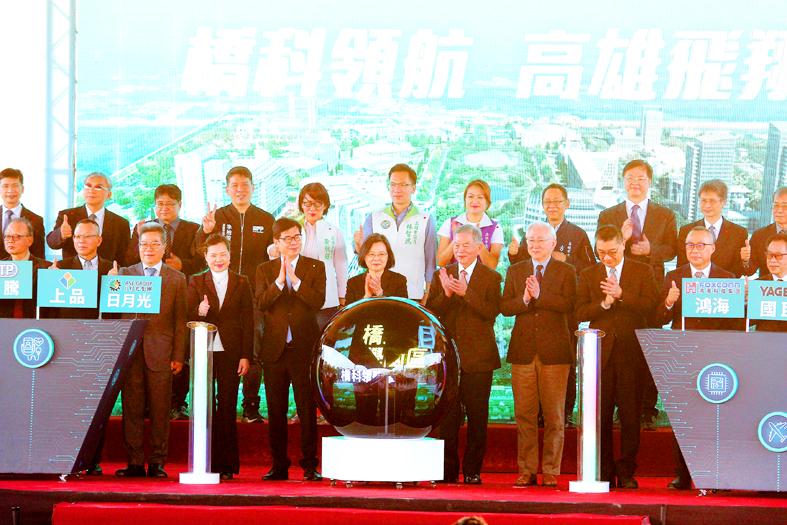Technology is the nation’s security guarantee, President Tsai Ing-wen (蔡英文) said yesterday, expressing the hope to make the world “more reliant on Taiwan.”
Tsai made the remarks during visits to the Ministry of Science and Technology’s Cyber Security and Smart Technology R&D Building in Tainan and a planned science park in Kaohsiung’s Ciaotou District (橋頭).
The cybersecurity building in Gueiren District (歸仁) houses 14 cybersecurity firms and the southern branch of the ministry’s start-up incubator Taiwan Tech Arena. The building is part of the wider Shalun Smart Green Energy Science City.

Photo: Lee Hui-chou, Taipei Times
“The world is watching Taiwan, especially its technology development,” Tsai said, adding that the nation has to speed up innovation.
Taiwan’s advanced technology and manufacturing prowess is critical to its survival and security, she said, adding that Taiwanese technology would help the nation create closer links with the world.
New high-tech industry clusters would be set up not only in northern and central Taiwan, but also in the south, she said.
“Taiwan would become the world’s biggest tech cluster,” she added.
Few people wanted to move for work to Gueiren five years ago, but the hub in the district is expected to become the cradle of Asia’s most advanced cybersecurity technology, featuring innovative start-ups, Minister of Science and Technology Wu Tsung-tsong (吳政忠) said.
A cybersecurity base managed by the ministry-affiliated National Applied Research Laboratories is on the building’s fifth floor.
The base is tasked with cultivating cybersecurity talent and promoting academia-industry cooperation, said Steven Tsai (蔡一郎), a researcher at the cybersecurity hub.
Since the COVID-19 pandemic started, businesses have increasingly adopted remote operations and placed increasing emphasis on ID certification, driving the need for cybersecurity defenses, he said.
Connected to the facilities of the National Center for High-Performance Computing, the cybersecurity base would regularly stage cyberattack and defense drills, he said.
One of the firms stationed in the new building, Systex Solutions Corp (精誠資訊), considers the new space appealing due to its proximity to the Southern Taiwan Science Park (南部科學園區), Systex operation and service division technical manager Erin Chang (張莉婷) said.
With more firms returning to Taiwan, the region is expected to attract more new businesses, she said.
Systex, which offers cybersecurity solutions, hopes to gain many clients among those firms, she added.
The Ciaotou Science Park (橋頭科學園區), which is under construction, is seeking to recruit businesses in the semiconductor, electric vehicle, and information and communications technology sectors, Southern Science Park Administration Bureau director-general Su Chen-kang (蘇振綱) said.
The planned science park would cover 352.44 hectares, including 186.49 hectares of industrial zones, 39.79 hectares of residential and commercial zones and 126.16 hectares of green land.
The park’s development plan was approved by the Environmental Protection Administration in September.
Kaohsiung Mayor Chen Chi-mai (陳其邁) said the city government would provide full assistance to businesses that seek to set up bases in the new science park, including on meeting water and electricity demand.

AIR SUPPORT: The Ministry of National Defense thanked the US for the delivery, adding that it was an indicator of the White House’s commitment to the Taiwan Relations Act Deputy Minister of National Defense Po Horng-huei (柏鴻輝) and Representative to the US Alexander Yui on Friday attended a delivery ceremony for the first of Taiwan’s long-awaited 66 F-16C/D Block 70 jets at a Lockheed Martin Corp factory in Greenville, South Carolina. “We are so proud to be the global home of the F-16 and to support Taiwan’s air defense capabilities,” US Representative William Timmons wrote on X, alongside a photograph of Taiwanese and US officials at the event. The F-16C/D Block 70 jets Taiwan ordered have the same capabilities as aircraft that had been upgraded to F-16Vs. The batch of Lockheed Martin

GRIDLOCK: The National Fire Agency’s Special Search and Rescue team is on standby to travel to the countries to help out with the rescue effort A powerful earthquake rocked Myanmar and neighboring Thailand yesterday, killing at least three people in Bangkok and burying dozens when a high-rise building under construction collapsed. Footage shared on social media from Myanmar’s second-largest city showed widespread destruction, raising fears that many were trapped under the rubble or killed. The magnitude 7.7 earthquake, with an epicenter near Mandalay in Myanmar, struck at midday and was followed by a strong magnitude 6.4 aftershock. The extent of death, injury and destruction — especially in Myanmar, which is embroiled in a civil war and where information is tightly controlled at the best of times —

Taiwan was ranked the fourth-safest country in the world with a score of 82.9, trailing only Andorra, the United Arab Emirates and Qatar in Numbeo’s Safety Index by Country report. Taiwan’s score improved by 0.1 points compared with last year’s mid-year report, which had Taiwan fourth with a score of 82.8. However, both scores were lower than in last year’s first review, when Taiwan scored 83.3, and are a long way from when Taiwan was named the second-safest country in the world in 2021, scoring 84.8. Taiwan ranked higher than Singapore in ninth with a score of 77.4 and Japan in 10th with

SECURITY RISK: If there is a conflict between China and Taiwan, ‘there would likely be significant consequences to global economic and security interests,’ it said China remains the top military and cyber threat to the US and continues to make progress on capabilities to seize Taiwan, a report by US intelligence agencies said on Tuesday. The report provides an overview of the “collective insights” of top US intelligence agencies about the security threats to the US posed by foreign nations and criminal organizations. In its Annual Threat Assessment, the agencies divided threats facing the US into two broad categories, “nonstate transnational criminals and terrorists” and “major state actors,” with China, Russia, Iran and North Korea named. Of those countries, “China presents the most comprehensive and robust military threat